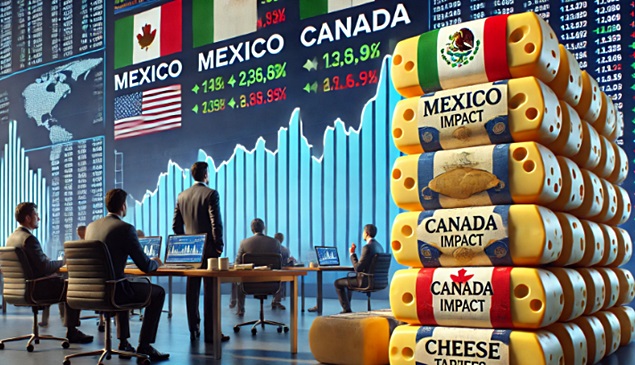1162

President Revisits Idea of Import Tariffs on Canada and Mexico: What’s at Stake?
A “Beautiful” Word
"Tariff" is "the most beautiful" word, President Donald Trump has said more than once. However, few can predict when or if he will fully follow through with imposing import tariffs on Mexico and Canada, the U.S.'s closest trade partners.
It took less than a day after his second-term inauguration for Trump to indicate how soon he wants these tariffs to take effect.
In November 2024, Trump pledged to impose a 25% import tariff on goods from Canada and Mexico, a move that could put key commodities, including dairy products, at the center of a trade war.
Since Trump’s announcement, both Canada and Mexico have hinted at possible retaliatory measures.
Canada’s Finance Minister, Dominic LeBlanc, called the tariffs "a mistake" and stated that his country is "fully prepared to respond to any of these scenarios."
Meanwhile, Mexico’s President, Claudia Sheinbaum, suggested that "one tariff will be met with another in response." However, she also indicated that Mexico is willing to cooperate with the U.S. on migration and drug trafficking—two cornerstone issues of Trump’s presidential campaign.
But what’s at stake when it comes to dairy trade?
The Numbers: U.S., Mexico, and Canada Dairy Trade
Mexico was the largest export market for U.S. dairy products in 2024, with approximately 576,000 million tons of dairy products shipped, according to USDEC data. By comparison, the second-largest destination was Southeast Asia (395,000 mt), followed by China (311,000 mt).
Cheese has become an increasingly important commodity: U.S. cheese exports to Mexico grew by 36% year-over-year as of August 2024, according to USDEC. Demand for powdered milk also rose, with Mexico being the largest destination for U.S. skimmed milk powder and the second-largest for whole milk powder, trailing only South America.
Since 2013, U.S.-Mexico dairy trade has nearly doubled (up 42% by 2023), reaching a total value of over $2.3 billion. Mexico purchases more than 25% of all U.S. dairy exports, while the U.S. supplies over 80% of Mexico’s annual dairy deficit.
Meanwhile, Canada was the eighth-largest export market for U.S. dairy by volume in 2024 (82,500 million tons), ranking ahead of New Zealand, Australia, MENA, South Asia, and Europe. Canada is also the largest export market for U.S. butter.
In terms of value, U.S.-Canada dairy trade grew by 63% over the last decade, reaching $1.09 billion.
In 2023, Canada exported approximately 83,800 mt of dairy products to the U.S., valued at $293,250,317. That year, cheese was the top export by value ($98,754,635), while whey was the largest by volume (37,400 mt).
Mexico and Canada are also the top two U.S. agricultural export markets for FY24, each valued at approximately $30 billion, according to ERS data.
Tariffs Threaten All Three Economies
While the proposed tariffs aim to strengthen the domestic U.S. market, Trump’s plan to impose blanket tariffs on Canada and Mexico poses a threat to all three economies.
According to the Peterson Institute for International Economics (PIIE), a 25% tariff on all goods would slow growth and increase inflation, shrinking U.S. GDP by $200 billion, reducing Canada’s economy by $100 million, and cutting Mexico’s growth rate by 2%.
Significant investment opportunities in dairy are also at stake. U.S. dairy companies are investing approximately $8 billion in processing facilities to expand market reach, expecting to add 20 million pounds of milk per day, making export markets even more crucial.
For all parties involved, the U.S.-Mexico-Canada Agreement (USMCA)—negotiated during Trump’s first term—has been key to improving trade and profitability across industries, including dairy.
With USMCA up for renegotiation in 2026, analysts see Trump’s tariff threats as a leverage strategy, potentially securing trade concessions from key partners.
Warwick J. McKibbin and Marcus Noland of PIIE argue that imposing tariffs now would be akin to "blowing up" the existing trade deal that Trump himself signed.





